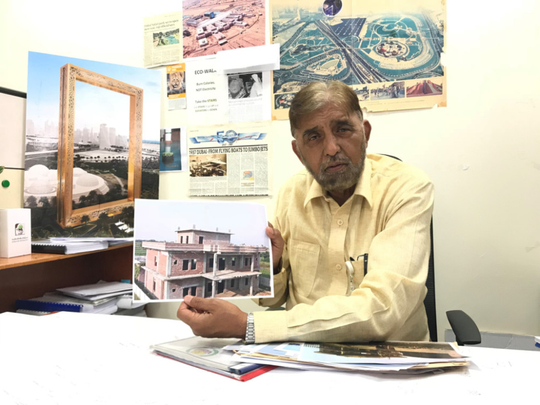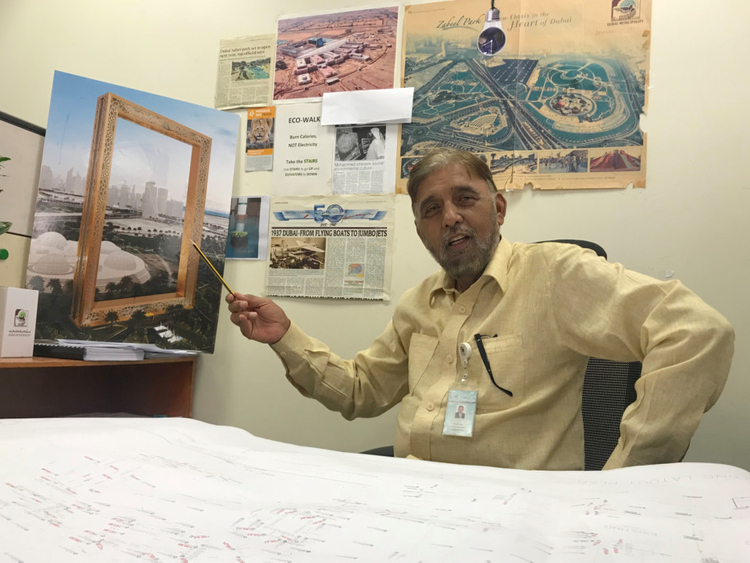
Dubai: He is known as a Dubai engineer who built the future for a Pakistani village.
Saeed Hayat, 69, who has many feathers in his cap as a Dubai Municipality engineer and as a philanthropist back home in Pakistan, is leaving the UAE for good after 42 years of service in the country.
Retiring as a Senior Drainage Engineer, Hayat had first flown into the UAE on May 10, 1975.
Initially, he worked with a British company to set up the drain network in Sharjah. He was in charge of two pumping stations and later for house connections.
In 1985, he joined Dubai Municipality and served its Drainage Department for 22 years.
During his long stint in the department, Hayat gave many valuable contributions to the development of the drain network of Dubai.
In 1995, he and his colleague Rashid Suwaidi came up with the designs of three types of grease traps which are now mandatory for all food establishments in Dubai.
“Prior to that, there was no concept of grease trap in eateries here,” recollected Hayat.
The reduction of fat, oil and grease waste entering drains and sewers is important, he said, to avoid blockage in the system and decrease the risk of flooding and foul odours.
The design of the catch basin for basement car parks, which is now mandatory for all buildings with basement car parking, was his another contribution in the same year.
“The catch basin is a collection point for wastage coming into the basement. It will hold the solid waste and sand, and divert only the waste water to the network system.”
There was no specification for the drainage for residential buildings in Dubai those days. “Engineers from different countries used their own specifications,” said Hayat.
“I standardised it and made specifications for the drainage in 1997. Now consultants are responsible for implementing those specifications and standard notes like pipe diameter, hose connections etc.”
In 2007, he moved to the Projects Department, designing drain and sewer networks for several projects, parks and labour accommodations of Dubai Municipality.
“Being the only drainage engineer with the department, I was responsible for drain and sewer network designs of every project with a toilet,” Hayat said, laughing.
He has worked for three mega projects — the recently opened Dubai Frame and Dubai Safari, as well as Shaikh Hamadan Sports Complex.
Hayat has also developed the sewer network design for the used truck market, the new fish market and the upcoming Quran Park.
He was also part of the team that prepared the book on standard details for sewerage and drainage in 2000.
The drain and sewer networks are very essential for any building, Hayat pointed out.
“Imagine spending millions on a building and foul smell coming if the sewerage is bad! A properly designed network will not release foul gas smell and won’t spread diseases.”
He said he considers himself lucky for having worked closely with Hussain Nasser Lootah, director-general of Dubai Municipality, Eisa Al Maidour, former deputy director-general, and other senior officials.
“Having Eid lunch every year at the director-general’s house is a very memorable experience,” Hayat said.
“I was supposed to retire nine years back. But my former director, Mohammad Noor Al Mashroom, kept me back. I can’t thank him enough.”
He is also thankful to Lootah, Al Maidour and other officials for attending his farewell party organised by his former colleagues Rashid Suwaidi and Farid Al Sa’adi.
Charity work
While he has made his mark in his professional field in Dubai, Hayat’s contribution back home has been through his charity projects.
Roras Road in Kotli Bhutta village of Sialkot in Pakistan is dotted with 10 charitable projects by him.
He has donated almost 100,000 sq ft of his ancestral land for setting up these projects which include a college for girls established by an NGO in 2008.
In 1995, Hayat started Al Illm Welfare Trust that is registered under the company law in Pakistan.
Except for the girls’ college, all other charitable projects by Hayat are set up by this trust. They include a religious education school for girls, a vocational centre teaching knitting and stitching, an outpatient clinic, an orphanage and a water purification plant.
A 20-bed maternity hospital, scheduled to open in April, is the latest project of the Trust.
What do they do?
“There are 135 students in the religious school for girls. In the knitting and stitching centre, we have two teachers and 10 tailoring machines. Around 45 to 50 patients daily visit the clinic which has one physician and two nurses.”
Hayat said free medicines for seasonal diseases are given to those who cannot afford them. “We just charge a nominal fee of Rs30 from others so that people will not misuse the medicine.”
Needy students are given scholarships in the college. Christian and Hindu students, who are the minorities, also study for free.
“The trust bears the costs of their education, books, uniforms etc. For Easter, each Christian family in the village receives one kilogram of sweets and for Christmas, biryani from the trust. We give free medicines to all minority families also.”
Thousands of people are benefiting from the water treatment plant also, he said.
“We have also set up boxes in 25 villages to collect damaged religious books and scriptures to preserve them so that they are not thrown into water resources.”
Hayat thanked his senior officials, colleagues and friends of various nationalities who wholeheartedly supported and generously donated for these projects.
“Had I not been living in Dubai, I wouldn’t have been able to give back to my village this much. I am especially thankful to my Indian friends here who have immensely supported me,” he said.







